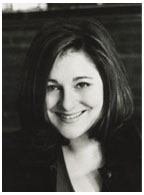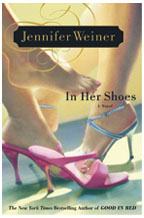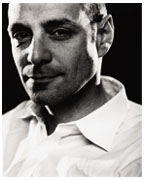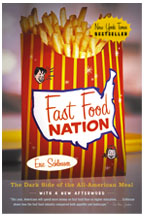January 29, 2003: Reading Room
 Chick
lit and proud of it
Chick
lit and proud of it
Jennifer Weiner ’91
has found a niche, and it’s kitsch
Photo: Weiner records her thoughts on life and culture in her online diary, SnarkSpot. (Jerry Bauer)
Although Jennifer Weiner ’91 worked for a decade as a journalist, covering everything from the Pillsbury Bake-Off to Wrestlemania, she says she never wanted to be “either Woodward or Bernstein. I wanted to be Nora Ephron, writing funny things about funny places.”
Over the past two years, Weiner has done just that, escaping journalism and landing instead on the bestseller lists. Her first novel, Good in Bed (2001), has sold a half-million copies, and her follow-up novel, In Her Shoes (Atria) — about two sisters who share a shoe size but nothing else — recently arrived in bookstores to promising reviews. People magazine proclaimed it “an entertaining romp through family battles and toxic relationships,” while Entertainment Weekly suggested that Weiner “hasn’t lost a bit of her knack for page-turning soap operatics.”
To Weiner, a connoisseur of kitsch and pop culture, “soap operatics” is not necessarily a slur. “My work tends to get written about as ‘chick lit,’ and there’s not much I can do about that,” says Weiner, an English major at Princeton. “But at least they call it smarter, funnier chick lit.”
In Good in Bed, Weiner created a character modeled loosely on herself — Candace Shapiro, a plus-sized Philadelphia Examiner reporter and Princeton alum who goes by “Cannie” so that people won’t be tempted to make fun of her weight by calling her “Candy.” She started working on the novel “when I got dumped,” says Weiner, who lives in Philadelphia. “I was moping around, sounding like a bad Britney Spears song. I wanted to write a novel in the voice of a girl who had been dumped like that.”
 In
Her Shoes maps the tempestuous relationship between Rose Feller, a brainy,
zaftig lawyer, and her sister Maggie, who’s zany, svelte, and out-of-control;
the narrative asks whether these opposites can find common ground in sorting
through their complicated family life.
In
Her Shoes maps the tempestuous relationship between Rose Feller, a brainy,
zaftig lawyer, and her sister Maggie, who’s zany, svelte, and out-of-control;
the narrative asks whether these opposites can find common ground in sorting
through their complicated family life.
Weiner draws on her Princeton experience in both books. At one point, Cannie considers opening a muffin shop before fretting about her classmates’ reactions upon seeing the news in PAW. And in In Her Shoes, Maggie spends part of her Princeton career living in a forgotten book-repair room in Firestone Library.
Weiner revels in sarcasm. Rather than posting a basic bio on her Web site (www.jenniferweiner.com), Weiner offers a cheeky résumé that mocks herself, her mother, and Wendell, her “small, spotted, anxious rat terrier.” Last year, Weiner unveiled a regularly updated “web-log,” called “SnarkSpot” to record her thoughts “on life, culture, and whatever’s going on today” — everything from observations about her book tour to complaints about lame TV shows.
Now her cockeyed view of life and relationships may be headed to the screen: Fox 2000 has optioned the rights to In Her Shoes for a feature film, and negotiations to turn Good in Bed into an HBO television series are under way. “I’ve made them promise they won’t call it ‘No Sex in the Other City,’” Weiner says.
By Louis Jacobson ’92
Louis Jacobson is a staff correspondent at National Journal magazine in Washington.
 Up-close
views of what you don’t want to see
Up-close
views of what you don’t want to see
Eric Schlosser
’81 writes about the worlds of fast food, prisons, and pot
The success of Eric Schlosser ’81’s first book, Fast Food Nation — a critical look at the American fast-food industry, from dangerous working conditions in meatpacking plants to relentless advertising aimed at young children — took the author by surprise. A history major at Princeton, he did stints, he says, as an “unsuccessful” playwright and novelist before turning to investigative nonfiction, citing John McPhee ’53’s course, The Literature of Fact, as both an inspiration and a gold-standard for his writing. His next book, Reefer Madness, is due out this spring, and he’s working on another about the nation’s prison system. Schlosser spoke with PAW’s Kathryn Beaumont ’96. Click here for the complete interview.
Why did you write Fast Food Nation?
Editors at Rolling Stone had read the piece I wrote for the Atlantic Monthly that was about illegal immigration, the history of farm labor — all these complex economic issues that I told through a very simple thing: a strawberry. And Rolling Stone asked me to do the same thing for fast food. To take this commodity that we all eat without ever thinking about it and go behind the counter and show how the system operates. I really wasn’t sure how interested I would be in it, to be honest with you — I mean, I ate fast food.
After writing about the sometimes unsanitary production of fast food, do you eat it anymore?
I still eat the same food. I just don’t eat it at the same places. I just don’t want to give these companies any of my money. My kids were really not happy when I said they couldn’t go to McDonald’s anymore. They were younger then, but they survived it. They still get to eat all kinds of junk food, and they still get to eat French fries, but just in smaller doses. I’m not a vegetarian, and my kids still eat meat, but they don’t get to eat ground beef because I’m concerned about the health risks.
 What’s
the motivation behind your investigative pieces?
What’s
the motivation behind your investigative pieces?
A lot of what I’ve been writing about — whether it’s migrant workers or meat-packing workers or the war on drugs — is taking things that I think are important and trying to get people to think about them. Behind all of my writing is the feeling that, “this is important, and people should know.”
How did the ideas for your next book come about?
A marijuana piece that I wrote for the Atlantic Monthly was the story of a pot-smoking hippie biker who got a sentence of life without parole in federal prison for his first marijuana crime. His case made me really think about prisons and about what we are doing with our prison system and who we are sending to prison and why. That story’s part of Reefer Madness. And investigating the war on drugs led me to write about prisons.
We have two million people in prison, and most of them are illiterate, emotionally impaired drug abusers who shouldn’t be in prison. No society in human history has ever imprisoned this many people for committing crimes. Because these people tend to be black or Latino, they don’t get the same attention they would if they were white, so it’s much more of a challenge to get people to care about what’s happening in our prisons than to get them to care about what’s happening in our fast food restaurants.
BOOK SHORTS
It’s Time — Reginald Gibbons ’69 (Louisiana). Covering a breadth of ideas and feelings, the author explores human consciousness and love, identity, and perception in this, his seventh book of poetry. Included in this collection are poems titled “The Nature of Thought,” “Mortal Men,” and “Stop” — a mother’s conversation with her child. Gibbons is a professor of English at Northwestern University and the recipient of numerous awards for his poetry and fiction.
The Deed — Keith Blanchard ’88 (Simon and Schuster). Blanchard has written a comic first novel about a New York City single guy named Jason, whose meaningless postcollege existence is interrupted by Amanda, a beautiful law student searching for the long-lost deed to Manhattan Island. She believes Jason is the only living heir to Manhattan, and together they search for the document but must contend with a New York crime family along the way. Blanchard is editor-in-chief of Maxim magazine.
Suspect Identities: A History of Fingerprinting and Criminal Identification — Simon A. Cole ’89 (Harvard). This history reviews the development of criminal identification, from photography to fingerprinting to DNA typing. Cole explores the relationships between state power, science and technology, and issues of identity, bringing into question the accuracy of criminal science. He also addresses people’s anxiety about the role of technology in society. Cole is an assistant professor of criminology, law, and society at the University of California, Irvine.
The Spiritual Chicks Question Everything: Learn to Risk, Release, and Soar — Tami Coyne and Karen Weissman *89 (Red Wheel). A guide for people looking for a more spiritual day-to-day life. The authors begin each chapter by posing a question such as “Do I need to go to church (synagogue, mosque, or a mountain top)?” and “I have a hard time meditating; can I still be spiritual?” Weissman teaches courses in metaphysics in New York City. Coyne is a spiritually oriented career and life coach. For a profile of Karen Weissman go to www.princeton.edu/paw.
Land of Enchanters: Egyptian Short Stories from the Earliest Times to the Present Day — edited by Bernard Lewis and Stanley Burstein (Markus Wiener). A collection of stories spanning the cultures of the Nile valley from ancient times to today, including Greek and Roman culture, Christianity, and Islam. Among the stories are “The Dream of Nectanebo,” about the Persian defeat of Nectanebo II and the reconquest of Egypt, and “Saint Pisentius and the Jealous Man,” about Pisentius, bishop of Coptos. Lewis is Cleveland E. Dodge Professor of Near Eastern Studies, emeritus. Burstein is a professor of history at California State University in Los Angeles.
Moy Sand and Gravel — Paul Muldoon (Farrar, Straus and Giroux). Muldoon’s ninth book of verse incorporates a rich variety of subjects, from Marilyn Monroe and Oscar Wilde to a loaf of bread and beagles. The volume concludes with Muldoon’s re-creation of William Butler Yeats’s “A Prayer for My Daughter.” Muldoon is Howard G. B. Clark ’21 University Professor in the Humanities.By Jeanne Alnot ’04
